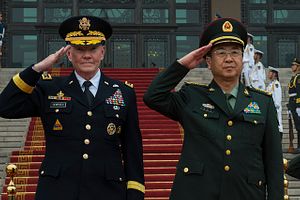On Wednesday, the esteemed Wall Street Journal ran a report titled “Pentagon Pauses New Exchanges With China,” with a subtitle stating that the two countries would not hold a new military exchange “until Washington and Beijing can agree on rules for encounters between warplanes.” The issue of Chinese flybys has been one of major concern for the Pentagon. Late last summer, a Chinese jet flew perilously close to a U.S. P-8 Poseidon maritime surveillance aircraft, almost causing a mid-air collision reminiscent of the 2001 Hainan Island incident. Still, the primary contention in the WSJ report, that new military exchanges have been “paused,” appears to be untrue based on reactions from both governments.
The WSJ report clarifies that the delay “doesn’t affect existing military-to-military exchanges.” Instead, the primary issue of contention is a potential U.S. carrier visit to China. Citing “officials,” the WSJ notes that “U.S. and Chinese naval officials had proposed the U.S. send an aircraft carrier on a visit to China, but Pentagon officials have deferred any decision until work on an air-intercepts agreement is complete.” As far as the carrier visit is concerned, neither the Pentagon nor the Chinese defense ministry have made direct comments. However, the report’s implication (particularly by way of the headline) that multiple future exchanges have been stalled drew reactions and repudiations from both U.S. and Chinese defense spokespersons.
The Pentagon, for example, said today, following the release of the report that there was no pause. Pentagon Press Secretary Rear Admiral John Kirby told the press, “There’s been no pause or disruption to military-to- military engagements between us and China. This is something we want to see continue. There’s obviously issues to work out, here. But there’s been no pause or disruption.” Separately, Pentagon spokesman Jeffrey Pool told China Daily on Thursday, “Our military-to-military ties with China have sustained positive momentum, and are beginning to demonstrate positive outcomes. Our actions speak for themselves.” Similarly, Yang Yujun, a spokesperson for the Chinese Ministry of National Defense said that the report was “unbelievable,” and that U.S.-China military exchanges had “good momentum.” As of this writing, the WSJ has not issued any clarifications or corrections to the story.
Adding to the pile of evidence against the implication that multiple future exchanges will be paused, Chinese President Xi Jinping vowed to increase military exchanges with other countries, ostensibly including the United States, on Friday. Additionally, shortly after the release of the WSJ report, Xinhua, China’s state-run news agency, ran a report reiterating that U.S.-China defense policy talks scheduled for the first week of February were on track (specifically, Chinese Rear Admiral Li Ji, deputy director of the Foreign Affairs Office of China’s Ministry of National Defense, will meet Deputy Assistant Secretary of Defense for East Asia David Helvey). On the defense policy talks, Jeffrey Pool, a Pentagon spokesman, told reporters that the meeting “is an important component of the broader program of engagements between the two nations’ militaries, which seeks to foster sustained and substantive dialogue, deepen practical cooperation in areas of mutual interest, and focus on enhancing risk reduction.”
Based on the WSJ report, it is unclear if the source regarding the freeze on future military exchanges was indeed within the Pentagon. The piece heavily cites Republican U.S. Congressman Randy Forbes, who sits on the House subcommittee on sea power. Forbes, a constant voice on U.S.-China military ties and the United States’ naval presence in the Asia-Pacific, is a well-known supporter of more assertive U.S. military diplomacy with China. The WSJ report cites a letter Forbes received from within the Pentagon, which noted that “U.S. policy toward China is based on the premise that it is profoundly in both countries’ interest that we develop a cooperative relationship that brings a rising China into that system while constructively managing the differences between our two countries.” The Journal‘s report does not directly quote either Forbes or the letter, authored by Christine Wormuth, the undersecretary of Defense for policy, regarding the freeze on military exchanges.
A U.S.-China agreement governing air-to-air encounters is part of the United States’ military diplomacy agenda with China and will likely resemble the U.S.-China agreement on confrontations at sea. That agreement was spurred by a late-2013 incident which a Chinese ship came within close proximity of the USS Cowpens, a U.S. Navy cruiser, in the South China Sea.

































